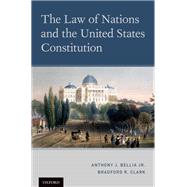
The Law of Nations and the United States Constitution
by Bellia Jr., Anthony J.; Clark, Bradford R.Buy New
Rent Textbook
Rent Digital
Used Textbook
We're Sorry
Sold Out
How Marketplace Works:
- This item is offered by an independent seller and not shipped from our warehouse
- Item details like edition and cover design may differ from our description; see seller's comments before ordering.
- Sellers much confirm and ship within two business days; otherwise, the order will be cancelled and refunded.
- Marketplace purchases cannot be returned to eCampus.com. Contact the seller directly for inquiries; if no response within two days, contact customer service.
- Additional shipping costs apply to Marketplace purchases. Review shipping costs at checkout.
Summary
Author Biography
Anthony J. Bellia Jr. is the O'Toole Professor of Constitutional Law and a Concurrent Professor of Political Science at the University of Notre Dame. He specializes in the teaching and research of constitutional law, federal courts, federalism, legal history, procedure, and contracts. He is the founding director of the Notre Dame Program on Constitutional Structure and a member of the American Law Institute (ALI). His published work includes many law review articles and the book Federalism. After receiving his J.D. from Notre Dame Law School, he clerked for Judge William M. Skretny of the United States District Court for the Western District of New York, Judge Diarmuid F. O'Scannlain of the United States Court of Appeals for the Ninth Circuit, and Associate Justice Antonin Scalia of the Supreme Court of the United States.
Bradford R. Clark is the William Cranch Research Professor of Law at George Washington University Law School. He specializes in the teaching and writing in areas of civil procedure, constitutional structure, federal courts, and foreign relations. His published scholarship includes a chapter in Pre-Emption Choice (2009) and articles in California Law Review, Columbia Law Review, Harvard Law Review, Texas Law Review, University of Chicago Law Review, University of Pennsylvania Law Review, and Virginia Law Review. He holds a JD from Columbia University School of Law, and he clerked for The Honorable Robert H. Bork of the U.S. Court of Appeals for the D.C. Circuit, and for The Honorable Antonin Scalia of the Supreme Court of the United States.
An electronic version of this book is available through VitalSource.
This book is viewable on PC, Mac, iPhone, iPad, iPod Touch, and most smartphones.
By purchasing, you will be able to view this book online, as well as download it, for the chosen number of days.
Digital License
You are licensing a digital product for a set duration. Durations are set forth in the product description, with "Lifetime" typically meaning five (5) years of online access and permanent download to a supported device. All licenses are non-transferable.
More details can be found here.
A downloadable version of this book is available through the eCampus Reader or compatible Adobe readers.
Applications are available on iOS, Android, PC, Mac, and Windows Mobile platforms.
Please view the compatibility matrix prior to purchase.
